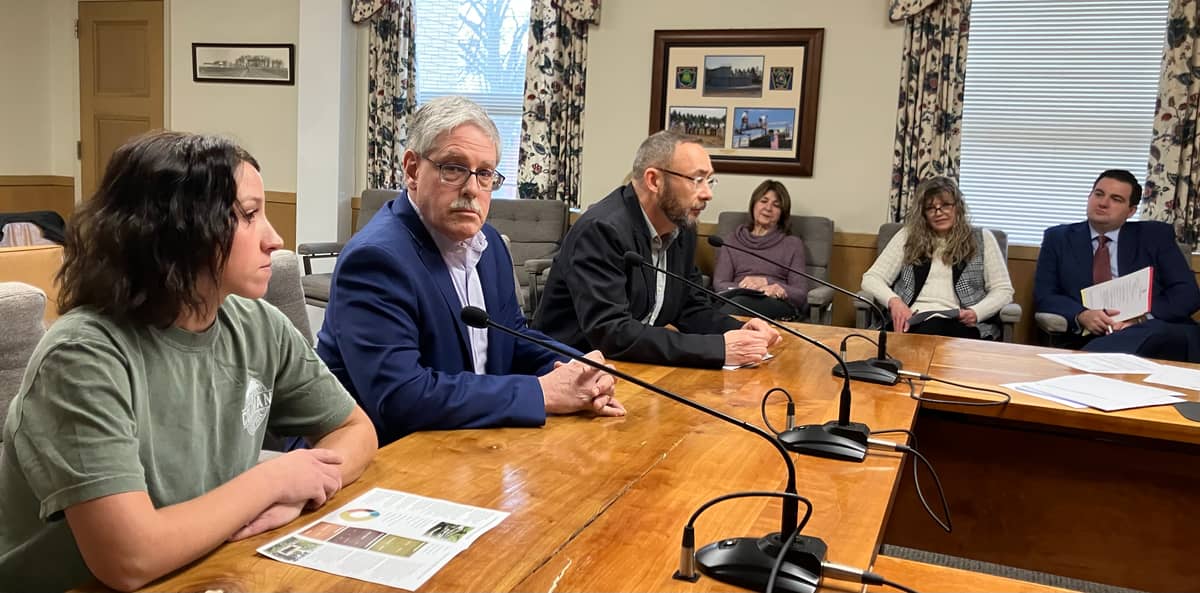Editor’s note: This article has been updated to correct a significant oversight by LebTown in the section dealing with the extent to which Lebanon School District taxes had increased during Mike Kuhn’s 28-year tenure as a board director. Our original analysis failed to take into account a 2004 change to the tax-assessment ratio in the county. We have updated the article appropriately, and sincerely regret the error.
With one week to go until the municipal primary election, rhetoric in the Republican primary race for Lebanon County Commissioner has ramped up.
Ads for and against incumbent Mike Kuhn have drawn most of the attention from observers and party insiders.
In contrast to the 2019 primary, when “Better PA PAC,” a committee registered to the offices of Long Nyquist + Associates and represented by an associate at the firm, took lead in a negative campaign against a then-incumbent, the late Bill Ames, this cycle the Lebanon County Republican Committee (LCRC) has itself directly adopted the tactic.
Read More: No punches held as Lebanon County Republicans splinter along Commissioners race
The distinction may be somewhat superficial; Long Nyquist– where LCRC chair Bill Bova works as a lobbyist – is today running the joint campaign of incumbent Bob Phillips and Swatara Township supervisor Bill Bering Jr. Amidst questions about whether the committee’s ads were misleading, Bova has pointed to ads supporting Kuhn that he says raise similar concerns.
Party attacks Kuhn in direct mail ads
The LCRC has issued at least two separate direct mail campaigns against Kuhn focusing on the same two key claims.
The first is the statement that Kuhn was “Democrat appointed.”
The second is the statement that Kuhn raised taxes on Lebanon city homeowners by 129% in his 28-year tenure on the Lebanon School District Board of School Directors.




LebTown examined the veracity of both statements. The first is a misleading, if not outright wrong, reference to underlying state law. The second appears to be generally accurate based on a straightforward calculation of percentage change in Lebanon School District taxes from when Kuhn took office in 1994 to when he left in 2021.
GOP apparently overlooks key aspect of state law
Following the death of Ames in December 2021, Kuhn was selected from two dozen Republican applicants for the position. Lebanon County President Judge John C. Tylwalk said Kuhn was unanimously selected by the Board of Judges to fill the remainder of the term previously held by Ames.
Also among the applicants were two other candidates in this year’s primary, Bering and Sharon Zook, as well as several party stalwarts: former state Sen. David “Chip” Brightbill, current state Rep. John Schlegel, Lebanon County solicitor David R. Warner Jr., and a handful of other current committee members. No allegations of impropriety in the appointment were made at the time it was announced in February 2022.
Read More:
- Mike Kuhn tapped to fill commissioner seat left vacant by death of Bill Ames
- Lebanon County Commissioner Bill Ames succumbs to COVID-19 complications
According to section 501(b) of the Pennsylvania County Code, vacated county commissioner seats are to be filled for the remainder of the term by the county’s Court of Common Pleas, which must appoint someone of the same party as the commissioner whose place is to be filled.
The county code does not specifically dictate how the court should make its decision. Pennsylvania law empowers president judges as the executive and administrative head of the court, including the promulgation of any administrative rules and regulations.
However, a rule adopted in 2019 does specify the process by which a Court of Common Pleas should fill a vacancy to an elected office. The Lebanon County Court of Common Pleas appears to have followed this process exactly – including following the provision that applications for the office should be made available upon request, which is how LebTown was able to publish statements of interest from each applicant in 2022.
Read More: Court releases info on applicants vying to replace late Bill Ames as commissioner
LebTown requested comment from Tylwalk about the claims made in the LCRC’s mailers, but Tylwalk said he needed to speak with the administrative office of Pennsylvania Courts to see if he is ethically allowed to make a public comment concerning a political race.
“I do not want to get in trouble, ethically, because judges are not allowed to be involved in political races,” Tylwalk told LebTown.
Tylwalk did, however, reach out to LebTown on April 15 following publication of an article on April 13 that contained an error. That particular article had announced LCRC’s endorsement of Phillips and Bering, and due to an editing error originally implied that Kuhn had been appointed specifically by Tylwalk.
Read More: Republican Committee votes to endorse Phillips & Bering in commissioner race
During that mid-April call, Tylwalk said the process involved all four county judges who received 24 applications from individuals seeking to fill Ames’ term. Six individuals were selected to be interviewed from the list and then the judges voted unanimously to select Kuhn to fill the vacant seat.
Kuhn, who has previously stated he had planned to run for Ames’ seat since the former commissioner had announced plans to retire, provided LebTown his account of the appointment.
“Judge Tylwalk did have the authority to appoint someone by himself, but he announced from the very beginning that he was going to involve all four county judges in the process,” said Kuhn. “When I was called for an interview, all four judges were at that interview. I interviewed on a Thursday evening, I was called on a Friday morning, and I was told I was their unanimous choice.”
Kuhn said he did not have any conversations with Tylwalk about the role prior to the interviews, and that doing so would have been inappropriate. “I don’t know that any candidate would do that,” said Kuhn.
The fourth individual on the Republican primary ballot is Zook, who questioned why the committee would mail a flyer that misrepresents the appointment process as it occurred in Lebanon County, which she also noted followed state law.
“Whoever made that flyer doesn’t even have a basic understanding of the law, code, or how government conducts business,” she wrote in an email to LebTown. “The bottom line is that the county followed PA Code 501(b) which states the court of common pleas makes the appointment, not an individual judge.”
Bova said that he believes the appointment statement on the mailer is not misleading.
“I think the president judge appointed Mike Kuhn, so the flyer is accurate,” said Bova.
“I’m not questioning the ethics of the judge, but by law it has to go to the governor and it doesn’t come from any other group, it comes from the president judge.”
Bova said what process the county put in place to appoint a replacement for Ames ultimately doesn’t matter since state law says the decision is made by the president judge. In instances where the remaining term of a commissioner needs to be filled, it must be by an individual registered with the same party.
“Listen, that’s the state law,” said Bova. “The bottom line is any county can come up with the process that they want, but, ultimately, the president judge doesn’t have to listen to any recommendations – it’s the president judge’s decision, by law. Again, if you look at the law, and I have no idea, you know, what the recommendations were, but the president judge doesn’t have to listen to any type of recommendations. They make the appointment, they’re responsible for the appointment, by law.”
It appears that the committee was relying on a 2015 manual for county commissioners for its understanding of the law. The same manual was texted to LebTown by both Bova and former county GOP chair Casey Long.
Former LCRC chair disputes account of Tylwalk’s involvement
After LebTown shared with Bova the 2019 rule that specifies the process, Bova said that he still believes the language used in the mailer was accurate.
“The stuff I have gotten suggested that it was Tylwalk’s pick and Tylwalk’s pick alone,” said Bova.
“I can go one step further than that because I asked Ed (Lynch), our former chair, about the whole process during that time. Ed said that Tylwalk met with Ed, and Tylwalk alone, and discussed who he was going to pick, and the pick himself,” said Bova, apparently referring to Kuhn.
“I’m just standing by that it was Tylwalk’s pick and Tylwalk submitted it. I talked to Ed and got some clarification because he was chair at the time.”
Bova would not say whether he had been previously aware of the 2019 rule before LebTown brought it to his attention. Although he did not seem to have been aware of it, he would not directly confirm that. “I was aware of what I sent you,” he said referring to the 2015 manual.
LebTown asked whether Bova thought that perhaps the committee had overlooked a directly relevant piece of law by relying on the 2015 manual.
“I don’t believe we missed anything material or directly relevant,” said Bova. “That’s what I’m standing by. Tylwalk made the pick.”
LebTown reached out to Lynch to confirm details of the conversation. Lynch said that Bova’s characterization of the meeting was not accurate. Lynch said that someone from Tylwalk’s office asked Lynch to come down for a meeting to discuss some of the candidates who had applied to be commissioner. Lynch said that the purpose of that meeting was informational, and that Tylwalk was looking for background on several candidates he did not know.
Lynch said that Tylwalk went down the list alphabetically and asked about several candidates he did not know, including a couple who were on the GOP committee.
Lynch said that Tylwalk explained the process and that the judges would be narrowing down the list to finalists, who would then be brought in for interviews, after which a decision would be made.
Lynch said that at no point did Tylwalk ask his opinion on who he would select, and that at no point did Tylwalk indicate he was going to pick Kuhn. Lynch said that Tylwalk did highlight the fact that in the event of a split vote by the other four judges, his vote would be the tiebreaker, as stipulated in the 2019 rule. Lynch said this was his only meeting with Tylwalk, and that the meeting lasted about 30 minutes.
Bova did not respond to LebTown’s further requests for comment.
GOP declines to share the math for 129% increase calculation; LebTown arrives at similar but different figures
The LCRC mailers claim that property tax increases by Kuhn totaled 129%, and that Kuhn voted to raise taxes 15 times.
Kuhn served seven four-year terms, or 28 years, on the Lebanon school board beginning in 1994.
The Lebanon School District shared with LebTown its own historical millage report, but district data only goes back to the 2005-06 school year, so LebTown consulted the Newspapers.com archive of the Lebanon Daily News. For the 1994-1995 school year, Lebanon School District taxes were 127 mills.
An analysis of historical tax rates is complicated by a countywide property reassessment that was first in effect for the 2013-14 school year, as well as a countywide change in 2004 to assess properties at 100% of their value, compared to 50%.
Both the reassessment and the tax-assessment ratio changes were designed to be revenue-neutral.
In the case of the reassessment, while property assessments went up, property tax millage rates in each taxing body (school district, municipality, and county) were adjusted correspondingly downward. In the Lebanon School District, the 1968-era property values used prior to reassessment were on average 14% of the 2012 values (or 14.0559% to be precise). The 2004 change, which first took effect for the Lebanon School District’s 2005-2006 school year, saw the millage rate halved as properties began to be taxed at 100% of assessed value rather than 50%.
So a millage rate of 127 in 1994-95 would be equivalent to a millage rate of 8.92 today – that is, 14% of 63.5, representing half of 127 mills to reflect the tax-assessment ratio change, and then adjusted downward based on the property reassessment factor.
The Lebanon School District’s millage rate for the 2021-22 school year was 21.72.
That represents an effective 143% increase over the 28-year period Kuhn was on the board. For context, the Consumer Price Index also rose more than 100% over the same period – $100 in January 1994 had the same buying power as $203.01 in December 2022, according to the U.S. Bureau of Labor Statistics.
Pointedly, these numbers are different than what was on the mailer. This reflects the complicated nature of normalizing tax rates while key factors such as tax-assessment ratio and assessed values are in flux. But it also stems from the fact that throughout LebTown’s reporting process, the LCRC repeatedly declined to share their figures.
On the mailers, the number of times Kuhn voted to increase taxes was attributed to school board minutes, while the percentage increase was noted as coming from the Lebanon City School District Millage Rate Index.
When LebTown asked Bova to share how the committee arrived at the percentage increase, he said he would need to revisit the numbers and requested a followup interview. During a followup call the next day, Bova said the figures were calculated by a firm outside of LCRC.
“We had a firm do it, a professional firm,” said Bova. “They looked at reassessments, the millage rates, the things that changed during that time. When millage rates change, assessment rates change, so there was a lot that went into that calculation. So we had an outside firm do it.”
LebTown requested the name of the firm and also asked how the information was obtained for the firm to calculate. Bova declined to state who the firm is and how the information was obtained.
“I’m not at liberty to say what firm did the tax calculations. It was done very carefully,” said Bova. “We have the data and we had an outside firm do it. I mean, that’s really all that I can tell you, and it did account for the millage rate changes and the assessment rate changes.”
After LebTown’s original version of the article was published, Long contacted LebTown. “Your tax calculations are completely wrong,” said Long. “Ours are correct. I hope u include an apology w your retraction.” (LebTown noted that we had been asking for their calculations since last Thursday.) It was at that point that Long told LebTown that we had overlooked the tax-assessment ratio change, causing LebTown to revisit our calculations and update this section of the article.
Mike Kuhn told LebTown he did raise taxes as a school board member.
“I can’t speak to their math, but I can speak to this: every school board member on every school board faces difficult challenges presented to them by the state because it’s called unfunded mandates,” said Kuhn.
“I learned very quickly on a school board that there are many things you don’t have any control over. Specifically, take one item: special education. For kids with special needs, we have mandates and we must provide for their needs. It is morally right and legally required. The state then tells us how much money we’ll get for special education. It has nothing to do with the number of kids we serve.”
Kuhn added that the state mandates don’t necessarily match the money needed to educate children with special needs.
“There’s a disparity between what the mandate is and what we’re getting from the state,” noted Kuhn, who added that one year the difference was close to $10 million. “When you face that kind of mandate and a lack of funds, a school district has no choice but to raise property taxes. When you’re in a school district like Lebanon that, basically, has no growth, you have an even more difficult challenge.”
Bova says mailers were LCRC’s decision, reflect LCRC concerns
Bova said that the decision of what to put in the mailer was made by the committee, and that neither Phillips nor Bering had reviewed or approved the content.
“We (LCRC) will do all that we can to support our endorsed candidates,” said Bova.
Bova declined to say who specifically authored the content, adding that he is responsible for the messaging as committee chair.
“It came from committee, it’s a group effort,” he said. “I’m not going to get into details of what each committee member’s role is. The bottom line is LCRC made an endorsement for commissioner, and I’m going to do everything I can for the endorsed candidates and differentiate the record and focus on what committee members were concerned about.”
Bova said the content for the mailers was chosen based on concerns gathered from LCRC members during the endorsement process, which ended with the committee choosing incumbent Phillips and newcomer Bering as their ticket over Kuhn, who is also an incumbent commissioner.
“We did this (mailer) because, frankly, it was what we’d heard during the district endorsement meetings, the concerns of the committee members, so that’s what we’re focused on, the differentiating factors and I’m focused on what our committee members had to say when we went through that endorsement process,” said Bova, who initially said real estate taxes were the No. 1 concern of LCRC members but later said during the same interview that he didn’t say that, and that real estate taxes were “one of the committee’s top concerns.”
LebTown noted that as commissioner, Phillips had voted to raise county taxes for the 2022 fiscal year – and in fact, this decision by him and Ames (along with the minority commissioner, Democrat Jo Ellen Litz) had led to the surprise presentation of a letter lambasting the 18-percent property tax increase that was signed by 65 LCRC committee members at a December 2021 public meeting of the commissioners. The letter was read at the commissioners’ meeting by Lebanon County Recorder of Deeds Dawn Blauch, who is today vice-chair of the Republican committee.
Bova said that he did not hear any discussions at the LCRC district endorsement meetings about Phillips having raised taxes.
Kuhn, who is an LCRC member, said he had no input into the mailer, and that he did not receive it in the mail.
“I don’t know who had the authority to do that and put the information together and who approved it,” said Kuhn. “Somebody either paid an advertising agency or put it together themselves. I have no idea of the process of how it was put together and who approved the content. Yeah, that part of it is distorted.”
Third-party ads for Kuhn draw criticism from Bova
Over the course of multiple interviews with Bova while reporting this article, the GOP chair pointed out two instances of ads supporting Kuhn’s candidacy that he said made false statements or otherwise misrepresented the facts.
Kuhn said that neither ad was produced in conjunction with him or the campaign.
Realtors’ PAC’s use of “re-elect” for Kuhn flyer under scrutiny
During the interview about the LCRC mailers, Bova questioned why LebTown was not writing an article about a mailer sent by a Realtors-connected PAC that he says contains misinformation about Kuhn’s campaign.
That mailer was sponsored by the Alliance for a Better Pennsylvania, a PAC connected to the Pennsylvania State Association of Realtors.

“Frankly, did you do an article on the Realtors’ mailer that came out that said ‘re-elect’? Did you ask the Kuhn campaign if they were involved in that mailer?” asked Bova. “Re-elect, you know, was a false statement. He was never elected. And I want to make that clear: Commissioner Kuhn was never elected by the people of Lebanon County. He is an incumbent by definition, but he can not use ‘re-elect’ because he is not being re-elected.”
LebTown contacted the Pennsylvania Department of State via email asking if the agency has an official opinion or guidance on whether a candidate who is an incumbent by virtue of appointment may use the word “re-elect” in their campaign advertising. A spokesperson declined to answer, and said that for county offices, the question was better suited for the county solicitor or district attorney.
A LebTown inquiry to the county solicitor, Warner, and Lebanon County District Attorney Pier Hess Graf did not receive an immediate response.
Guidance from other sources is mixed. Ballotpedia, a widely used wiki-style elections database, uses the term “re-elect” to refer to any incumbent who is running in an election to retain their office, including incumbents who were originally appointed to their position. Washington State’s Public Disclosure Commission says that “re-elect” can only be used for candidates who were previously elected to the office, and that “retain” should be used for appointed incumbents. The Florida Department of State says that “re-elect” can be used for any candidate who is currently in possession of an office.
Kuhn said he believes Bova is “splitting hairs” and “missing the point” because he was appointed and is currently serving as a county commissioner. He also said the content was not vetted by his campaign prior to it recently being mailed.
“Absolutely not,” said Kuhn. “I had no knowledge nor an endorsement, but I was honored when I heard about it. That is a flyer I think I got in my mail a week or so ago. I don’t recall the specifics of when, though.”
Kuhn said he is unfamiliar with the Alliance for a Better Pennsylvania, the organization that mailed the flyer.
“All the information you cited to me, I never knew anything about them or where they are located,” said Kuhn. “What I can tell you is that all candidates were interviewed by the Lebanon County Association of Realtors and I was the sole candidate to get their endorsement.”
Kuhn added he’s honored that this organization sent a mailer on his behalf.
“You don’t look a gift horse in the mouth,” said Kuhn. “As far as the content in it, I thought everything was accurate and correct. It seems more like it was supporting my experience and character as an elected official.”
A spokesperson for Alliance for a Better Pennsylvania said that the Alliance engages in races which support candidates for state and local offices who support the real estate industry and homeownership, and that the mailer was not coordinated with the Lebanon County Association of Realtors.
“The Alliance does not coordinate with any other organizations because it is an independent expenditure political action committee,” said Kim Shindle.
Shindle said that the organization chose to support Kuhn over his advocacy for Realtor issues and his commitment to working with the real estate industry.
“He has a strong understanding of the importance of real estate and homeownership,” said Shindle
Unregistered PAC runs ad in Merchandiser
In a May 3 edition of the Merchandiser chockfull of political ads – including a full-page ad on the cover for the Phillips-Bering campaign – tucked away on page 15 was an ad for Kuhn run by “Citizens of Lebanon County.”

The ad was brought to LebTown’s attention by Bova on Thursday, May 4, as being possibly run by an unregistered PAC. A search of state records did not show any PAC by the name of Citizens of Lebanon County.
LebTown reached out to the Merchandiser and spoke with salesperson Cornell Wilson, who said that the ad was not submitted by the Kuhn campaign, but that he could not say who submitted it due to customer privacy. Wilson said he would pass along LebTown’s request to speak with the submitting organization.
LebTown contacted county elections director Sean Drasher that evening and received a call from Drasher the next morning saying that he had begun looking into the PAC. (Both the LCRC and LebTown were contacting Drasher’s office about the situation by this point.)
Drasher followed up that afternoon to say that the ad wasn’t actually run by a PAC, “just a local citizen who was acting on their own.”
That citizen turned out to be Bob Smith, owner of Candy-Rama in the Lebanon Farmers Market and husband to Carol Kapp Smith, daughter of the late Robert S. Kapp, who was the founder of Kapp Advertising Inc., the company that publishes the Merchandiser. Whether Smith has an ownership interest in the Merchandiser was not immediately clear.
“I had a long conversation with (Smith) and they seem genuinely confused by the campaign finance regs and how they may have walked themselves into unexpected territory,” said Drasher, quoting Smith as remarking – “I’m just a citizen of Lebanon County!”
Drasher said that because Friday was still within the campaign finance filing window – the last day of the window, in fact – Smith was able to come into the office and report the expense. Drasher said that Smith did in fact file the proper paperwork for that advertising expense later in the day, but that he filed the paperwork as himself and there remains to be no organization called Citizens of Lebanon County.
“That does not seem like a mistake to me,” said Bova. “How do you not know?”
Bova said that the only reason Smith filed is that he was contacted after inquires were made.
“In my opinion, the Merchandiser should have known better,” said Bova.
Bova said that he was told Candy-Rama had an extra ad that they hadn’t used.
“I’m asking for an apology (from Smith) to both Phillips-Bering and the LCRC over a misleading ad, with a clearly made up PAC,” said Bova, adding that he felt the Merchandiser should apologize, too.
Bova said he could see people who read the ad wondering who the people were that ran it. “They aren’t people, they’re one person,” said Bova. “They’re one person with an ownership interest in the Merchandiser.”
Bova went on to say that perhaps an apology to the Phillips-Bering campaign and LCRC wasn’t enough.
“Frankly, they should apologize to the people of Lebanon County for misleading them,” said Bova. “But I don’t represent the people of Lebanon County, I represent LCRC.”
Kuhn said that he emphatically absolutely did not have any knowledge of the ad Smith ran, but that he was pleasantly surprised with it.
“As a matter of fact, I wanted to find out so I could thank them,” he said.
Kuhn said that it didn’t surprise him that Smith didn’t file properly, and that he didn’t think Smith was very active politically. “He’s been a supporter, but I’ve really never spoken to him about any specifics of our campaign,” said Kuhn. “What he did was completely on his own.”
LebTown contacted Smith on Sunday seeking comment and context on the situation.
After LebTown apologized for interrupting his weekend, Smith asked LebTown why they would do that. LebTown said it was important to provide an opportunity for comment, and that Bova had made statements and allegations against him.
Smith declined to be interviewed.
“I don’t want an article run on that ad, at all,” said Smith.
“If you are, I’m going to sue you. I’m definitely going to sue if you run that article.”
Smith declined to discuss what grounds he would sue LebTown over and ended the call.
Just a week remains in the campaign
The spat over ads is the latest in an ongoing saga in the Republican primary race for the office of commissioner.
Read More:
- Republican committee chair says focus misplaced after Wetlands sign removal
- Bering silent after Phillips relays implicit threat to Kuhn: Drop out, or sting video of campaign sign removal will be released
- Mystery leaker pushes intra-party feud into spotlight; prelude to factious primary
All the candidates, though, have said they wanted this campaign to be a positive one. As part of this reporting, LebTown asked each candidate how the overall campaign and their personal efforts have helped realize that goal so far. Read their responses here.
Read More: GOP contenders for commissioner reflect on whether it’s been a positive campaign
The municipal primary election will be held Tuesday, May 16.
When LebTown asked Bova if any more LCRC mailers were going to be sent prior to primary election day, he responded, “Maybe.”
Questions about this story? Suggestions for a future LebTown article? Reach our newsroom using this contact form and we’ll do our best to get back to you.

Support Lebanon County journalism.
Cancel anytime.
Monthly Subscription
🌟 Annual Subscription
- Still no paywall!
- Fewer ads
- Exclusive events and emails
- All monthly benefits
- Most popular option
- Make a bigger impact
Already a member? Log in here to hide these messages
An informed community is a stronger community. LebTown covers the local government meetings, breaking news, and community stories that shape Lebanon County’s future. Help us expand our coverage by becoming a monthly or annual member, or support our work with a one-time contribution. Cancel anytime.

























